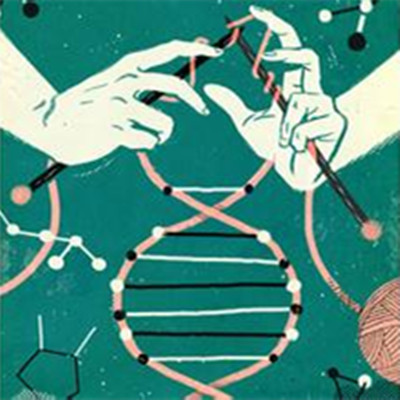(单词翻译:单击)
听力文本
Just below the Arctic Circle in northern Sweden sits a town called kalix.
It's home to only about a thousand people.
But those inhabitants were the subjects of a seminal study in human genetics:the research suggested that what our parents, or even grandparents ate—if they grew up during feast or famine—could actually affect our risk of heart disease and diabetes.
"It shows that either caloric restriction or excess of food, can send, depending on the window of your own development, a similar message to the next generation."
Romain Barres, a molecular biologist at the University of Copenhagen.
That trans-generational message is sent, of course, through sperm and eggs.
So Barres and his colleagues compared the sperm of 13 lean versus 10 obese men.
And they found that the heavyweights had epigenetic changes to their sperm—meaning additional chemical groups on their DNA that affect how genes are expressed.
And many of those changes were to sequences known to affect brain development—including genes that regulate appetite.
But the changes were not permanent.
Because when the researchers studied the sperm of men who underwent weight loss surgery, they found that many of those genetic alterations reversed post-surgery, especially the ones in areas related to appetite control.
The study is in the journal Cell Metabolism.
The big question now is how much these epigenetic changes actually influence the next generation.
Barres is now comparing fathers' sperm to the cord blood of their babies, to find out.
But the finding suggests a mechanism by which our actions, our eating habits, our fitness, can affect our children.
Which might make you wonder: what should you be eating?
"And how long should you be doing pushups before you conceive your child?
It's a long road before what we know is optimal for our children."
And what may seem optimal today—like partaking of holiday feasting—may come back to haunt your children's children, like the ghost of Christmas past.
参考译文
瑞典北部的北极圈附近有一座名为卡利克斯的小镇。
这座小镇仅有1000人。
但是这里的居民则是人类遗传学开创性研究的实验对象:这项研究表明在我们的父母,甚至祖父母的成长过程中,在宴会时或饥荒时所吃的东西实际上会影响我们罹患心脏病及糖尿病的风险。
“我们的研究结果表明,热量限制或过度饮食都会在自己的成长过程中将信息传递给下一代人。”
哥本哈根大学分子生物学家罗曼尼·巴雷斯说道。

当然这种世代消息的传递是通过精子和卵子完成。
巴雷斯和他的同事们在试验当中将13名瘦弱男子及10名肥胖男子的精子进行比较。
而结果他们发现肥胖受试者的精子会发生表观遗传学改变—这意味着DNA的额外化学基团会影响基因的表现形式。
而且许多改变都发生在影响大脑发展的DNA序列上—其中就包括控制食欲的基因。
但是这些改变并非永久性的。
因为研究人员对减肥手术后男子的精子进行了研究,结果他们发现术后许多基因都有了改变,尤其是控制食欲的基因。
这项研究已在《细胞新城代谢》杂志上发表。
而现在关键问题在于这些表观遗传学改变对下一代的影响程度。
巴雷斯现在通过将父亲的精子同婴儿的脐带血进行比较以找出答案。
但这项研究表明我们一举一动,饮食习惯,我们的健康都会对下一代产生影响。
你可能会想那应该吃什么呢?
“在怀上孩子之前,你应该做多久的俯卧撑?
在我们知道什么对生育下一代有所助益前,这都是一条漫长的道路。”
“今时今日看来是最理想的分享节日盛宴等习惯,日后可能会困扰你的孙子,就像过去的圣诞节幽灵一样。”
译文为可可英语翻译,未经授权请勿转载!
重点讲解
1.grow up 长大
例句:He'll grow up to be somebody.
他长大了一定能成材。
2.depend on 依赖
例句:Industry and agriculture depend on and support each other.
工业和农业是互相依赖、互相支援的。
3.relate to 涉及;同…有…关系
例句:The firm said the charges would relate to the disclosures Goldman made as underwriter of an offering of$ 1.3 billion worth of mortgage-backed securities.
高盛称,指控将涉及其作为13亿美元按揭抵押债券发行承销商的信息披露问题。
4.find out 发现
例句:It is very unnerving to find out that someone you see every day is carrying a potentially deadly virus.
发现朝夕相处的人竟携带着一种可能致命的病毒是一件令人很不安的事情。


